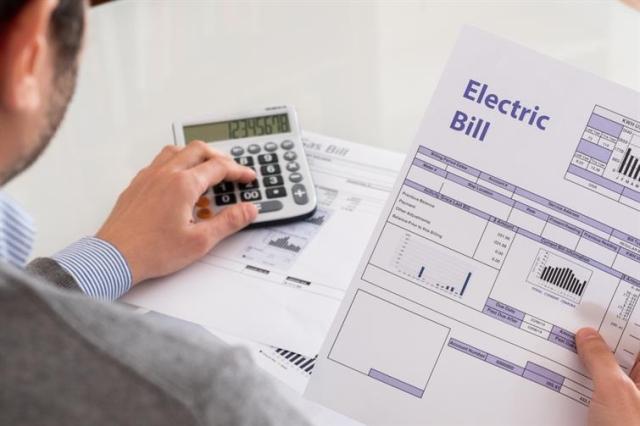After months of searching for an apartment online, you've finally moved into a place that you love. The location, amenities, and monthly rent of your new apartment fit right in with your lifestyle and budget. But a few months in, you realize that you’re still spending more than 30 percent of your income on rent and don’t know why. As the biggest expense for most renters next to monthly rent, your utility bill might be the culprit.
- How to lower your electric bill
- How to lower your water bill
- Other ways to save on utilities
It’s generally advised to set aside about $300 to $400 a month for utilities and to make sure that your average utility bill isn't more than 10 percent of your income. But several factors will affect this, so every renter can expect a slightly different utility bill based on factors like the size and location of your home, how many people live with you, the season, etc. For example, someone living in a studio apartment will have a much lower monthly bill than a family in a five-bedroom house. During the winter and summer months, when the weather is at its most extreme, be prepared for higher than average utility bills (especially power bills). How much utilities cost also varies by state. Alaska and Connecticut have some of the highest utility bills in the country while New Mexico has some of the lowest. By taking a few simple steps and being conscious about usage, renters can cut down their bill dramatically.
What is considered a utility bill?
In order to save money on your average utility bill, you’ll need to identify what is considered a utility. In a very basic sense, utilities are services that you use in your home like water, gas, sewer, electric, and trash. While those are normally considered necessary utilities, internet, cable, and streaming services can be considered utilities too. If you’re unsure of how you pay for utilities, check your lease or ask your landlord or property manager. There are a few ways property owners and managers can charge tenants for utilities, which can affect your utility bill and how you set up your utilities. Some apartments may even include utilities with rent, so double check to make sure you know how you’re being charged. Another important thing to note is that many apartment communities are completely electric, so some renters won’t have to worry about a gas bill.
Once you have determined what your utilities are and how you pay for them, the next step is to understand how much your utilities cost by understanding how the cost is calculated.
Utility costs
How much does a water and sewer bill cost?
Water and sewer services are sometimes lumped together, but the prices are determined by usage. Water is most commonly measured by centum cubic feet (CCF) or hundred cubic feet (HCF). You’re charged based on the amount of water used times the water rate in your area. Sometimes water prices will inflate during a drought or summer months to encourage conservation. Check with your water company seasonally to see what the water rate is in your state.
While a water bill covers the water flowing into your rental, the sewer bill covers the water running through your drains, toilet, sink, etc.
How much does a gas bill cost?
There is no standard for how companies measure natural gas. Your monthly bill could be based on the amount of heat required to increase one pound of water a degree (BTUS), by the cubic feet of natural gas used (MCFS), or a variation of the two. You can identify the way you’re charged by looking at your monthly bill. Typically, you’re charged based on usage, but some places have tiered pricing, meaning the rate will change after you use a certain amount of gas. The more gas you use, the more you’re charged. Contact your gas company for their current rates.
How much does an electric bill cost?
Unlike gas companies, almost all electric companies measure electricity usage by a standard way, kilowatt-hours. The cost is normally determined by kilowatt-hours used times the rate of electricity.
How much do other utilities cost?
Trash service will vary depending on your community. Most landlords will put trash into a general service or utility bill that includes things like pest control, maintenance, etc. Whether you are responsible for hiring your own service or it’s tacked onto another bill, you should expect a fixed rate each month for trash.
Other bills like cable, streaming services, and Wi-Fi are normally billed monthly via a fixed rate. You have many options for these kinds of services, so shop around if you feel like you can get a better deal. To save some extra money, try cutting out or limiting your streaming services and cable plan.
Variable vs. fixed rates and how to choose a plan
The U.S. Energy Information Administration reports that the average household spends around $115 on their average electric bill which is about $1,400 per year. As a result, electricity is normally the priciest utility, leaving many people wondering how to lower their electric bill. The good news is: you have a few plan options that could help lower your monthly energy bill.
One option is a fixed rate. This plan is when the price per kilowatt-hour stays the same through the duration of your contract. When the market price changes, your rate will not be affected. While it might make your bill more consistent, a fixed rate doesn’t mean that your bill will be the same each month. You’re still charged based on usage, but the rate you’re charged stays the same. The downside to this plan is that sometimes the market prices dip, so your fixed rate won’t allow you to benefit from this.
Another option is a variable rate. A variable rate is when the rate of kilowatt-hours are based on the market price and your electric company, so unlike the fixed rate, a variable rate will fluctuate. Sometimes it may drop lower than the fixed rate price, but it could also raise above it during peak times, creating a disadvantage.
The final choice is an indexed rate. An indexed rate is similar to a variable rate, but the prices are solely determined by a publicly available index. The benefits and downfall to this plan are similar to the variable rate. You’ll benefit when the index price drops, but your bill will be higher when the index price rises.
Each of these plans come with pros and cons. Look around and choose the one you think will help you lower your power bill.
Easy ways to lower your electric bill
We've all had one of those months that has us questioning why our electric bill is so high. Although the average electric bill tends to be the most expensive utility bill, there are several things you can do to shrink your power bill without sacrificing comfort.
Switch out lights
First, make sure your home is running efficiently. Replace traditional incandescent bulbs with energy efficient ones like LEDs. These use less electricity and emit less heat than the traditional bulbs.
Use fans
Make sure you’re using your heating and air efficiently by using fans. You can run them counterclockwise to make a room cooler or run them clockwise to circulate the heated air in the winter. If you don’t have ceiling fans and aren’t allowed to install them yourself, large oscillating fans should do the trick.
Cut out leaks
The next thing you’ll want to check is that you’re not wasting electricity by having air leak into or out of your home. The biggest way to cut down your average electric bill is to check your doors and windows. If there’s a gap between your door or window and the floor, purchase some weather strips to slide under and fill the space. The not-so-obvious way air could be leaking is through outlets. Purchase some plastic outlet covers to plug them up when not in use.
Avoid phantom energy
Another way renters unknowingly waste electricity is through phantom energy. When you leave things like TVs, toasters, charging cables, etc. plugged in, they still use electricity. When items aren’t in use, unplug them to lower your electric bill.
Run your HVAC properly
Because of extreme temperatures, winter and summer tend to rack up the highest energy costs. To prepare for these months and save on your electric bill, make sure everything is running properly. Identify which heating and cooling system you have in your rental. There are many different heating and air systems, but most rentals have central air with an HVAC system. With this system, you’ll have an HVAC unit located somewhere in your rental, and it pumps cold or hot air to other rooms in your home via the vents. To maintain these systems, you’ll want to make sure that the filter is being replaced monthly or every other month. You’ll also want to keep the temperature around 78 degrees Fahrenheit during the summer. This may seem warm, but there are plenty of ways to keep your home cool without AC. During the winter, the energy preferred setting is 68 degrees Fahrenheit. Look at some tricks to stay warm without blasting the heat.
Eliminate dust
Another tip to save on electricity is to eliminate dust. When you’re cleaning, dust off things like refrigerator coils and make sure the lint trap in your dryer is clean. Built up dust and lint can make your appliances work extra hard and eat up more electricity than necessary.
There are many ways to save on your electric bill. Get creative and choose methods that work best for you and your household. Hopefully, you'll never have to wonder why your electric bill is so high ever again.
How to save money on your water bill
According to the EPA, the average person uses about 88 gallons of water per day, and about half of that water is being wasted, negatively affecting the environment and your budget.
Conserve water
The first step in water conservation is to be conscious of how much water you’re using. For example, turn the water off while doing things like brushing your teeth. Instead of continuously running the water while washing dishes, fill the sink up with a bit of soapy water and turn the faucet off between rinses. Using the dishwasher actually saves water and electricity, so hand wash only when necessary.
Collect extra water
To get creative, put a bucket in the shower to collect water to use for your plants. Place something under the faucet to collect the cold water while you wait for it to heat. You can even save the water you boil for pasta for things like watering plants.
Use cold water
Using cold water when possible will help your water and energy bill. Try to not make the water extremely hot when showering, and always wash your clothes with cold water. On that same note, only use the washing machine when you have a full load of clothes.
Fix slow leaks
It’s also important to stay on top of maintenance. Dripping faucets, slow leaks, and running toilets can lead to thousands of wasted gallons. Make sure you’re aware of any issues and get them fixed as soon as possible to avoid additional costs.
Other ways to save money on utilities
Go green
Some long-term investments like energy-efficient appliances, planting trees, and solar panels will pay off in the long run but require a bit of initial investment and some patience.
Request an energy audit
You can request an energy audit from your provider to see where your biggest costs are coming from and how to reduce your usage and your bill. Many companies will do this at no additional cost to you. You can also ask your utility company about discounted rates because rates will be higher at peak times of the day.
Set appliances to the right temperature
Check that your appliances are at the right temperature. We know the energy preferred setting for the HVAC system is 78 in the summer and 68 during the winter, but your water heater and fridge need to be at the right temperature too. Most water heaters will be set at 140 degrees Fahrenheit, but lowering the temperature to 120 degrees is advisable. If you’re going to be gone for a few days, consider lowering it to the lowest setting to save even more. Just be mindful of the time of year, you don’t want frozen pipes. Your refrigerator should be set to 38 degrees Fahrenheit and the freezer should be at 0 degrees.
Invest in smart technology
Investing in smart technology can also save you from wasting money while you’re away. A smart thermostat allows you to adjust the temperature while you’re gone, smart power strips can be turned off with your phone, and a light left on by accident can be switched off while you’re away as well.
There are countless ways to get creative and lower your utility bills. As long as it works for you and your home, you should be on your way to saving money in no time!






